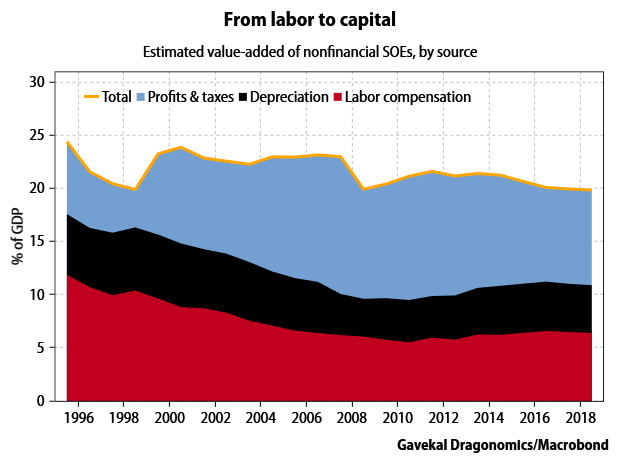THREAD on the role of state vs private in China’s economy, inspired by this article, which is provocative but ultimately pretty flawed. https://www.wsj.com/articles/china-xi-clampdown-private-sector-communist-party-11607612531
Articles on this theme often conflate two different ways the Communist Party might try to "control" private firms:
Articles on this theme often conflate two different ways the Communist Party might try to "control" private firms:
1) Setting broad boundaries and objectives -- e.g., DON’T disrupt social stability, financial security, DO promote tech innovation, digitization, environment, etc
2) Interfering in management -- e.g., hire these executives, choose this vendor, design product with these features.
2) Interfering in management -- e.g., hire these executives, choose this vendor, design product with these features.
Sure, 1) and 2) could overlap in some cases, but in principle they are different. So when we hear about private companies setting up CCP committees, we have to ask which they’re doing. To the extent the committees do anything at all, it's mostly 1), rarely 2).
And in most private companies, party committees serve *neither* of these objectives, because it’s all just for show 形式主义. In practice most CCP committees in private companies do nothing except host the occasional drab study session. https://twitter.com/gabewildau/status/1151592953552527366
The article includes a graph showing Chinese state-owned enterprises' rising share of global GDP, but this reflects *China's* rising share of global GDP. Key conclusion of @Gavekal's masterful report is that SOE share of China's GDP has been essentially *unchanged* for 20+ years.
The article cites the private sector's difficulty getting loans to claim Xi is "starving" them of credit, but this problem predates Xi by decades, and Xi's government has adopted a slough of policies to address the issue. 5/ https://andrewbatson.com/2019/06/28/there-is-no-problem-with-small-business-lending-in-china/
Maybe these policies failed, but they undermine the claim that Xi is actively trying to squeeze the private sector. Elevated state role in economy is mainly a side effect of other policy objectives, notably a commitment to excessively high GDP growth. https://twitter.com/andrewbatson/status/1254588450243612672
Conversely, the financial deleveraging campaign of 2017-18 led to a choking off of credit to private firms. Tougher environmental enforcement also disproportionately hit private firms, which are dirtier. These are side effects, not first-order objectives. https://twitter.com/andrewbatson/status/1212535911289720832
Chinese private firms DO face big obstacles, but Xi's "distrust" or antagonism towards private sector is the wrong lens. Fundamental factor is CCP's political-ideological commitment to a large role for state enterprises, which also predates Xi (as @gavekal analysis above shows.)
SOEs' dominance of many sectors makes it impossible for private firms to compete. Where Xi deserves blame for the private sector's struggles is in his refusal to embrace transformative SOE reform to level the playing field. @hzsong https://macropolo.substack.com/p/mp-econ-issue-2-soe-reform
The WSJ article also contains a very significant mistranslation of a statement by Liu He, China's top economic policymaker, as explained in this thread. https://twitter.com/ZichenWanghere/status/1337069662014681091
Finally, we have to consider the ideological context for the article. In the US, a few huge companies stand astride the economy, while democratically-elected governments cower at their feet. It is a neoliberal society, and this article by elite US media is a neoliberal critique.
The article's implicit neoliberal premise is that private-sector prerogatives should trump political ones. But political trends in the democratic West suggest that neoliberalism is unpopular with non-elites, who might welcome stronger political boundaries on private firms. /END
P.S. As the various links in this thread show, I've learned a lot about this issue from @andrewbatson. Though I don't assume he agrees with this entire thread, thanks all the same for the many insights and great research.

 Read on Twitter
Read on Twitter



